Middle East
Gaza is being starved and bombed again. Why are we allowing it? | Israel-Palestine conflict
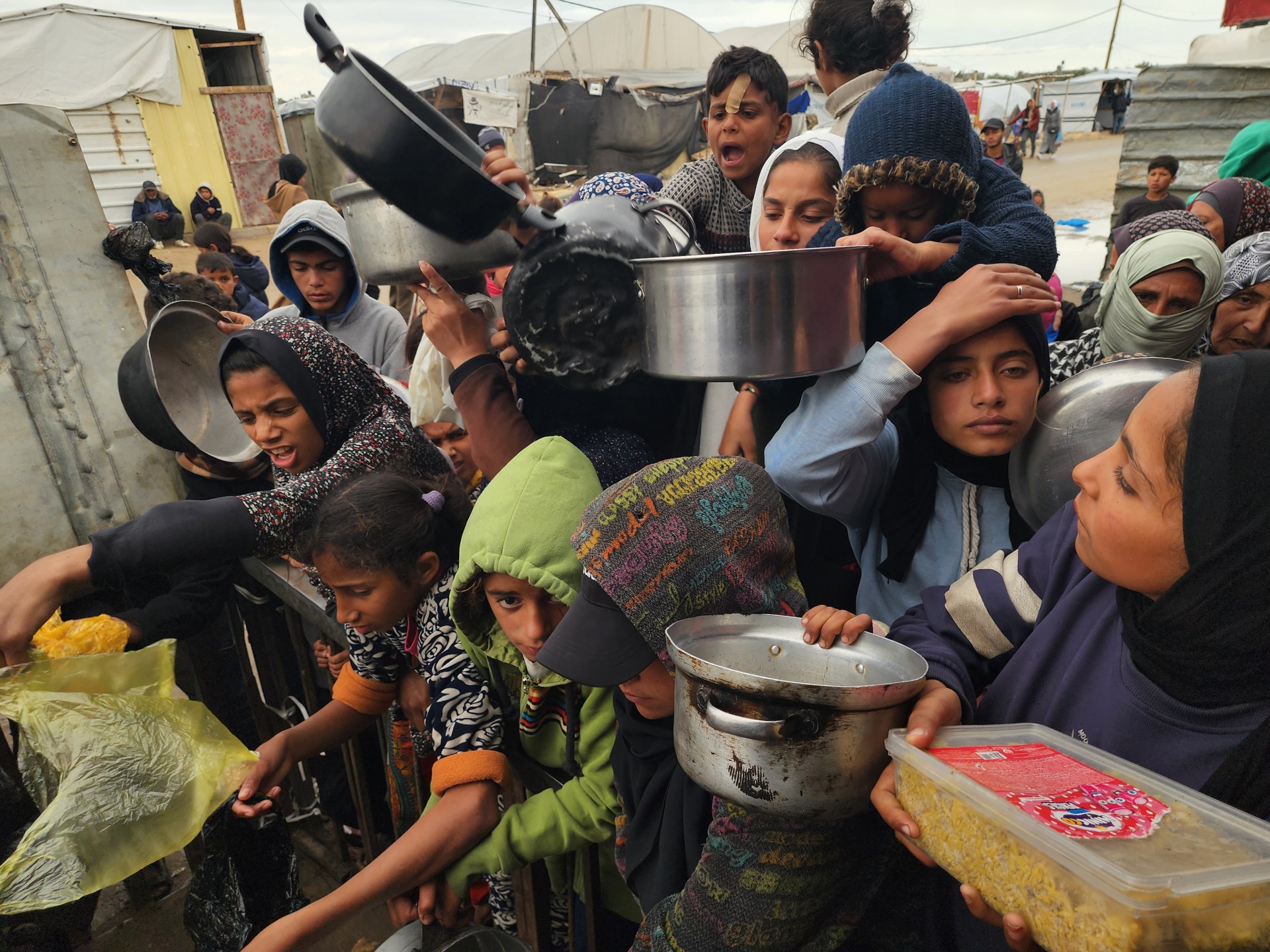
“My family’s situation is very difficult, sister. I couldn’t afford food. Everything here is expensive.” These words were sent to me on March 15 by Ramez, a 17-year-old boy living in Gaza. “I don’t have anything to eat tomorrow. I don’t know what to do. Hunger has come back again.”
Three days later, just before suhoor, the last meal before the daily fast begins during the holy month of Ramadan, Israel unleashed a huge campaign of bombardment, killing more than 430 Palestinians, including more than 180 children.
“Only God knows what we are going through,” Ramez messaged me the next day. “We left without taking anything with us, and now we are on the street. The situation is extremely bad. Everything happened suddenly, and we didn’t expect it. A massacre occurred right in front of us, and they asked us to evacuate under the shelling.”
Last year, Ramez had reached out to me on Instagram, a platform that has become a lifeline for countless people in Gaza calling out to the world for help. I do not know Ramez’s family personally nor do I have any historical connection to Gaza. Yet, out of the millions of accounts on Instagram, his message found its way to mine.
In the following months, his messages became a window into the daily suffering of the Palestinian people in Gaza. The ceasefire offered a temporary respite from the bombing and allowed Ramez to return to his home. Then, on the second day of Ramadan, Israel cut off all aid, triggering starvation again. On the 18th day of the holy month, it renewed its mass slaughter.
As I break my fast, here in Berlin, I think of all the Palestinian families that have almost nothing on their iftar tables, who instead of the call to prayer, hear Israeli bombing.
This can’t be real life, can it? Humans, just a few thousand kilometres away, are literally starving and dying under bombs. And here I am in the heart of the Western world, which professes values of democracy and freedom and yet, directly contributes to the mass murder of the people of Gaza.
The taxes I pay as a German citizen go directly to a government that fully supports Israel in its genocidal war on the Palestinians. The thought of it makes me feel horrified.
Hunger and genocide in Gaza
Ramez has been writing sporadically. I have hesitated to ask him for more detail, unable to bear the suffering he and his family face daily.
I know there were days when he only ate a few falafel balls and some pita bread.
His dreams are to finish high school and to study accounting. Instead, day after day, he is forced to reach out to Instagram users, asking them to donate and share his fundraising link.
His father got injured before the war and now lives in constant pain, urgently needing a shoulder replacement. He has left Ramez responsible for the family.
Ramez has two brothers, aged 15 and 14, and three sisters, aged 20, 12, and 8. His father used to work as a water and electrical mechanic, while his mother is a housewife.
“Destruction and hunger remain in Gaza,” Ramez posted a few weeks after the ceasefire was announced. His family’s situation was still dire. While they received some food donations from humanitarian organisations, it was not enough to meet their needs.
They had returned to their home in southern Gaza, in an area where Israeli bombardment had decimated civilian infrastructure and buildings alike.
Ramez had to travel long distances to reach a humanitarian distribution centre – often, the transportation costs were higher than the value of the aid he received.
Though commercial goods were available in the market, his family couldn’t always afford them. They have no source of income apart from the occasional donation they would receive from strangers on Instagram.
After Israel blocked all aid into Gaza, food prices skyrocketed. Humanitarian aid has dwindled, food charities and soup kitchens have closed for the lack of supplies. Ramez’s family hasn’t received any aid in weeks.
Now there is only canned food and some vegetables in the market, he told me. “I cannot provide anything. I need about $100 a day for food because of the high prices.”
On March 15, almost two weeks into Israel’s full blockade on Gaza, UNICEF reported that malnutrition rates of children under the age of 2 in northern Gaza have risen from 15.6 percent in January to 31 percent at present; 23 children had died of malnutrition and dehydration in the span of a few weeks.
The rest of the Strip has also seen a sharp rise, with Catherine Russell, UNICEF executive director, noting that “the speed at which this catastrophic child malnutrition crisis in Gaza has unfolded is shocking.”
Experiencing malnutrition during childhood can have lifelong consequences, including a higher likelihood of developing noncommunicable diseases and reduced immune system functionality. Furthermore, malnutrition-induced developmental delays can lead to irreversible deficits in cognitive and motor abilities, an elevated risk of behavioural challenges, and substantially diminished educational outcomes.
In other words, Israel’s starving of children in Gaza right now is destroying the next generation.
Egging on war crimes
In November, the International Criminal Court (ICC) issued an arrest warrant for Israeli Prime Minister Benjamin Netanyahu and former Defense Minister Yoav Gallant. It accused the two of – among other crimes – intentionally starving civilians in Gaza.
Western countries that claim to uphold international law have readily declared that they will violate it and host Netanyahu. Among them are Hungary, Italy, Poland, and Germany.
Friedrich Merz, who is set to become the next German chancellor, recently stated: “Under my leadership, the Israeli prime minister will be able to travel to Germany without any trouble. I’ll find ways to make that happen.”
These declarations have signalled that the West had no intention of holding Israeli leaders to account for their crimes. Unsurprisingly, after facing no consequences for his ICC arrest warrant, Netanyahu decided to not only renew but ramp up genocidal starvation and indiscriminate bombardment in Gaza.
After Israel fully blocked aid to Gaza, Germany, France and the UK issued a joint statement saying “a halt on goods and supplies entering Gaza … would risk violating international humanitarian law.”
This response, which refuses to call a crime a crime – was utterly shameful. On March 17, when British Foreign Secretary David Lammy gathered the courage to point out the obvious – that Israel is indeed breaking international law with its blockade of aid to Gaza – he was rebuked by his own government.
If deliberately starving and bombing a civilian population is not breaking international law, then what is? Western governments’ attempt to downplay and conceal Israeli crimes before the public is clear evidence of their complicity in these same crimes.
Western governments are obliged under international law to take action to stop grave violations. They should be exerting diplomatic pressure on Israel, imposing arms embargoes, restricting trade and cooperation. But they are not.
Instead of pointing out Western governments’ complicity and failure to act and stop a genocide, Western mainstream media has also been ignoring Palestinian suffering or worse – misleading the public about it. Starvation in Gaza did not even make headlines after Israel blocked all aid. The shocking massacre on March 18 did, but it was all neatly packaged with Israel’s justification of it.
The Western media regularly ignores or downplays Israeli officials’ genocidal declarations. Just recently, on March 19, Israeli Defense Minister Israel Katz addressed the Palestinian people of Gaza, threatening that they will face “complete destruction and devastation” if they do not expel Hamas and return the Israeli captives. This threat of genocide was reported as a “warning” and it evoked no reaction from Israel’s Western allies, except a weak condemnation from Lammy.
Watching this show of empty talk, complicity, betrayal and gaslighting for 17 months now has been exhausting. It is a destructive narcissistic show of manipulation and display of power designed to wear down those of us who resist the normalisation of genocide – to break us.
But I’ve reached a point where I refuse to feel powerless and exhausted any more in the face of this overwhelming injustice.
Ramadan is a time when the strength of faith is supposed to be renewed. It is a time of sacrifice but also a time of joy, of community and personal growth. I won’t allow Israel and its allies to sabotage my belief in justice. The people in Gaza have taught us how to hold on to faith and stand steadfast – no matter what.
I will continue to hold onto the conviction that our voices and actions, no matter how small, can contribute to change. We must not stop raising awareness and pressuring our governments to take action. Our strength lies in standing together and reminding each other to continue believing, to continue fighting for justice.
The views expressed in this article are the author’s own and do not necessarily reflect Al Jazeera’s editorial stance.
Middle East
Thousands gather for centuries-old Holy Fire ceremony in Jerusalem | Jerusalem News
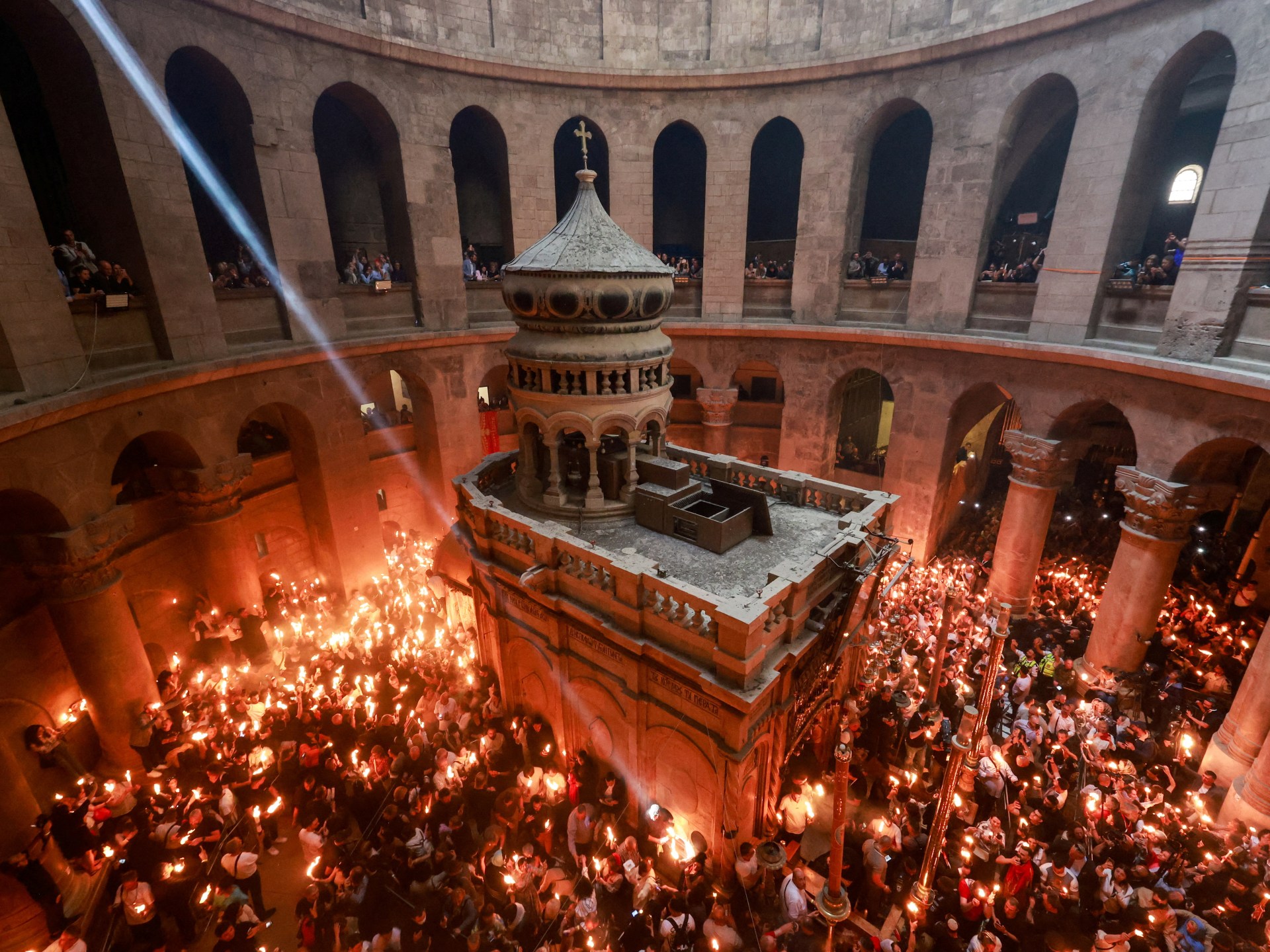
Thousands of Christians gathered in the cavernous Church of the Holy Sepulchre for a centuries-old Holy Fire ceremony.
Holding unlit candles, they packed into the sprawling 12th-century basilica built on the site where, according to tradition, Jesus was crucified and buried.
In near-total darkness, the Greek patriarch entered the Holy Edicule and emerged with two lit candles. The flame was passed from one candle to the next, the light overcoming the darkness in the rotunda. The flame was later transferred to Orthodox communities in other countries on special flights.
Eastern Orthodox Christians believe the light miraculously appears inside the Holy Edicule, built on the traditional site of Jesus’s tomb, while sceptics going back to the Middle Ages have dismissed it as a carnival trick for the masses.
Either way, the ceremony, which goes back at least 1,200 years, is a sight to behold. It has also ignited safety concerns.
In 1834, a frenzied stampede broke out in the darkened church, and the ruler of the Holy Land at the time barely escaped after his guards drew swords and hacked their way through the crowd, historian Simon Sebag Montefiore recounts in his history of Jerusalem. Some 400 pilgrims died in the melee, most from suffocation or trampling.
Israeli authorities have sought to limit participants in recent years, citing safety concerns. That has drawn protests from church leaders, who have accused them of upsetting the delicate, unwritten arrangements around Jerusalem’s holy sites known as the status quo.
On Saturday, there was a heavy military presence as thousands of worshippers passed through Israeli checkpoints to enter.
Some worshippers lamented that the turnout lacked numbers this year because of Israel’s 18-month war on Gaza. “The number of police is higher than the number of pilgrims,” said Adeeb Joude, key holder for the Holy Sepulchre.
Israel captured East Jerusalem, including the Old City with major sites sacred to Jews, Christians and Muslims, in the 1967 Middle East War, and annexed it in a move not recognised internationally. The Palestinians want East Jerusalem to be the capital of their future state.
The Old City has a long history of tensions between Israelis and Palestinians, among different religious groups that share its hilly confines and even within certain faiths. Perceived infringements on the status quo in the Church of the Holy Sepulchre have led to brawls between monks of different denominations.
Israel says it is committed to ensuring freedom of worship for Jews, Christians and Muslims, and has long presented itself as an island of tolerance in the Middle East.
In recent years, however, tensions have risen with the local Christian community, most of whom are Palestinian Christians, a population that has dwindled through decades of conflict as many have moved abroad.
Middle East
US attacks Yemen again after at least 80 people killed in Hodeidah | Israel-Palestine conflict News
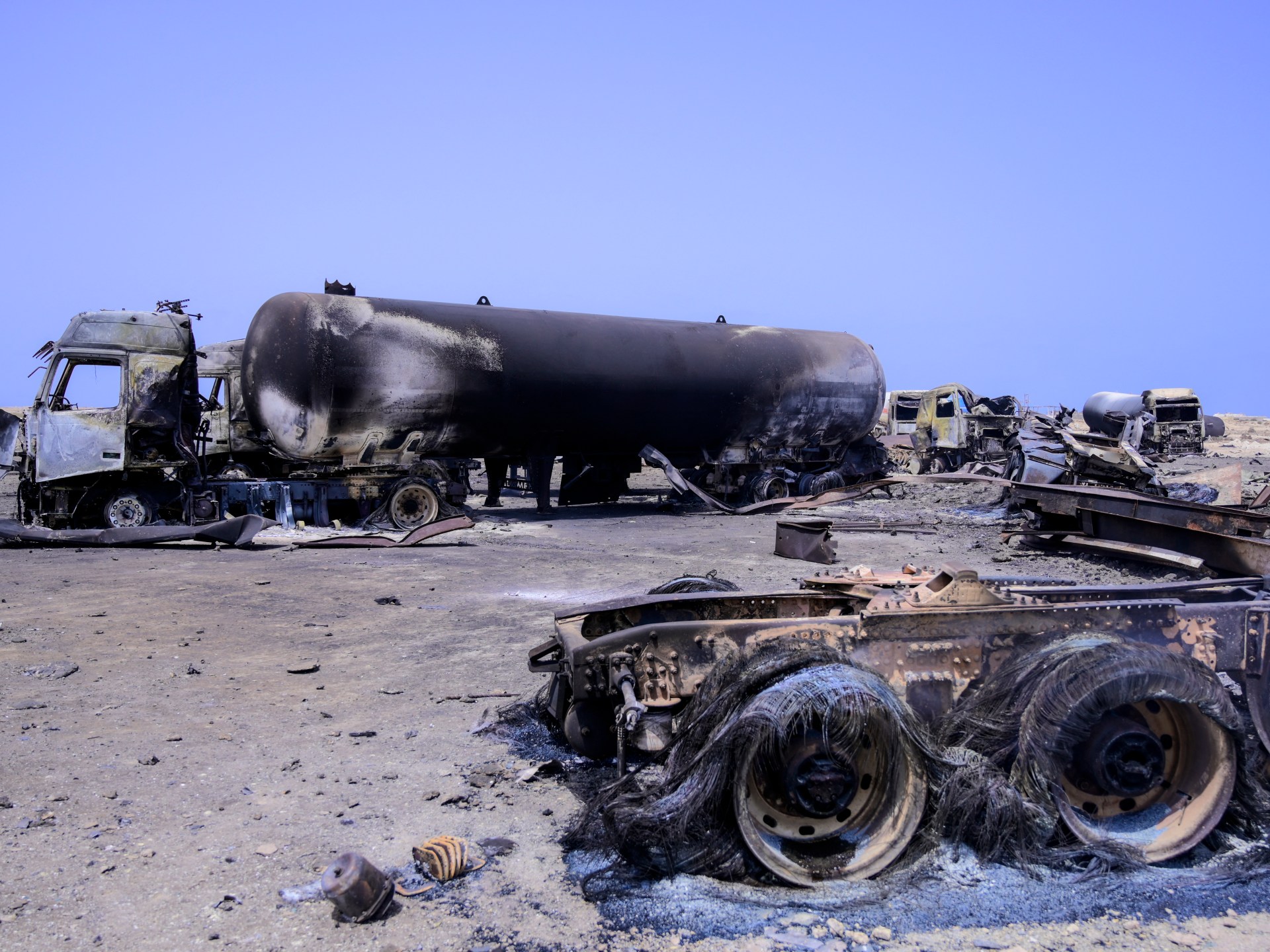
UN chief Antonio Guterres says he is ‘gravely concerned’ about US air strikes this week on Yemen.
The United States has carried out 13 air strikes on Hodeidah’s port and airport, the Houthi-affiliated TV channel Al Masirah says, two days after a US air strike targeted the Ras Isa port, also in Hodeidah, killing at least 80 people and wounding more than 150.
Al Masirah also reported Saturday that three people were killed and four injured due to a US attack on al-Thawra, Bani Matar, and al-Safiah districts in the capital Sanaa.
The Houthis have promised to carry out “more operations” despite the ongoing US attacks.
US President Donald Trump’s administration announced a major military offensive against the Houthis a few weeks ago. It said the air strikes are aimed at forcing the Houthis to stop threatening ships sailing on the Red Sea on a route crucial to international trade.
Since November 2023, the group has reportedly launched more than 100 attacks on vessels it says are linked to Israel in response to Israel’s war on Gaza and in solidarity with Palestinians.
On Friday, Houthi official Mohammed Nasser al-Atifi told Al Masirah that the “American enemy’s crimes” will not deter the Yemeni people from supporting Gaza, but “rather will strengthen their steadfastness and resilience”.
The Houthis, also known as Ansar Allah or “supporters of God”, are an armed group that controls most parts of Yemen, including Sanaa. The group emerged in the 1990s but rose to prominence in 2014 when it seized Sanaa and forced President Abd-Rabbu Mansour Hadi to flee the country.
United Nations Secretary-General Antonio Guterres “is gravely concerned about the airstrikes conducted by the United States over the course of 17 and 18 April in and around Yemen’s port of Ra’s Isa, which reportedly resulted in scores of civilian casualties, including five humanitarian workers injured,” Guterres spokesman Stephane Dujarric said in a statement on Saturday.
Guterres expressed fears of damage to the port and “possible oil leaks into the Red Sea”, Dujarric added.
The strikes on Ras Isa aimed to cut off supplies and funds for the Houthis, the US military said. It was the deadliest attack of Washington’s 15-month campaign against the Iran-aligned group.
About 70 percent of Yemen’s imports and 80 percent of its humanitarian assistance pass through the ports of Ras Isa, Hodeidah and as-Salif.
Ras Isa also is the terminus of Yemen’s main oil pipeline, which, along with its port, are “critical and irreplaceable infrastructure” in Yemen, according to the UN Development Programme.
Middle East
Iran says progress in nuclear talks with US, confirms third round next week | News
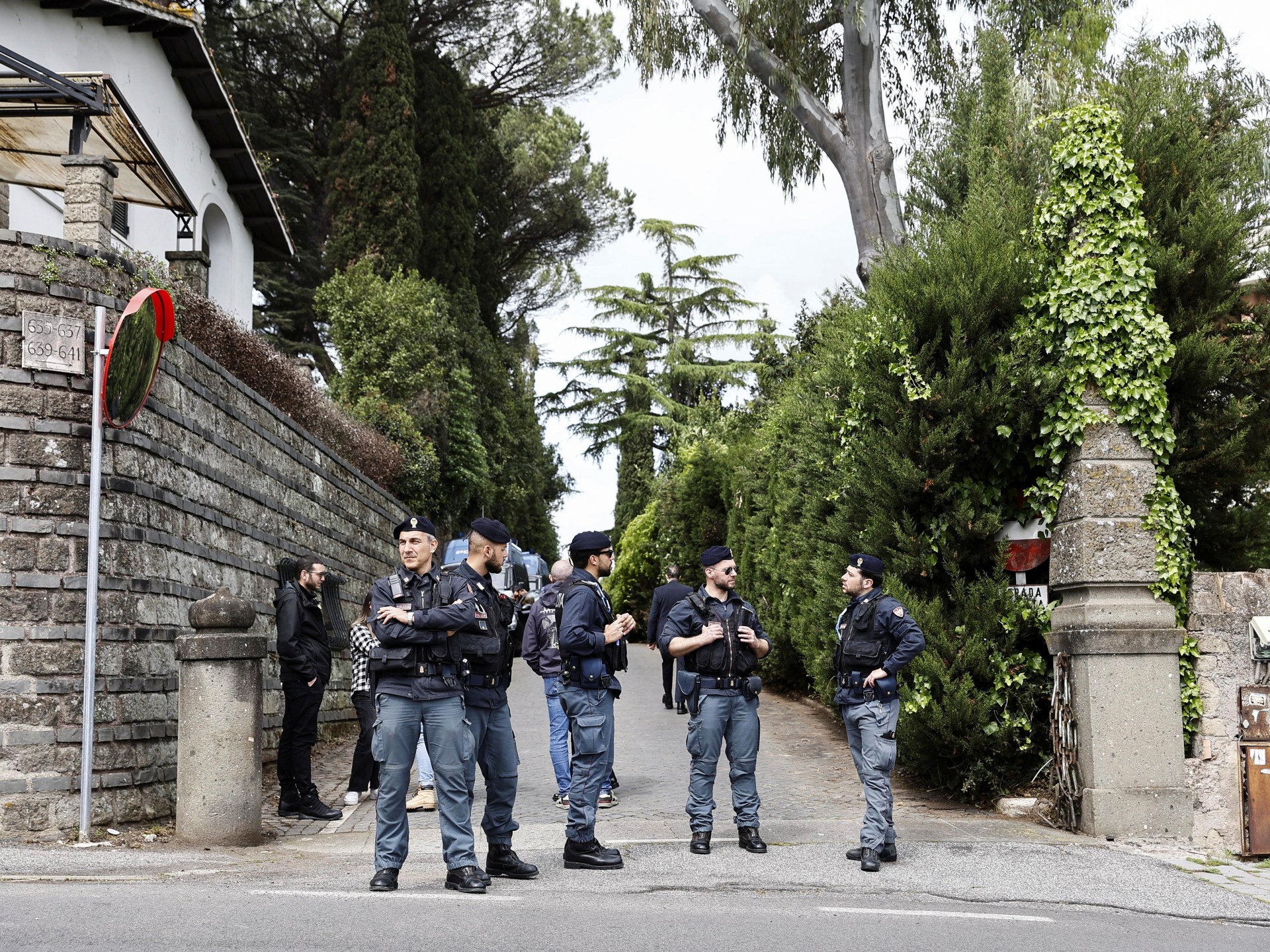
After technical talks, senior negotiators expected to reunite on April 26, according to Iran’s foreign ministry.
Iran and the United States have completed a second round of indirect nuclear negotiations, which Iran’s foreign minister has described as “constructive” and moving forward with further meetings planned in the coming week.
Abbas Araghchi and US Middle East envoy Steve Witkoff held four hours of indirect talks at Oman’s embassy in the Italian capital, Rome, on Saturday, according to Araghchi.
“We succeeded in reaching a better understanding on certain principles and goals,” the diplomat was quoted by the semiofficial Tasnim news agency as saying. “The negotiations were conducted in a constructive atmosphere and are progressing.”
There has been no readout yet of the meeting from the US side.
The delegations – led by Araghchi and Witkoff, a billionaire real estate executive whom US President Donald Trump has dispatched on numerous foreign policy missions – stayed in separate rooms in the embassy as Omani Foreign Minister Badr al-Busaidi shuttled messages between them, according to Iranian officials.
Iran’s Ministry of Foreign Affairs said the parties will hold more indirect, technical-level talks in the coming days, followed by another meeting with senior officials on April 26.
There were useful indirect talks today between Iran and the United States conducted by Oman Foreign Minister in a constructive atmosphere.
The two sides agreed to continue the indirect talks in few days at technical level to be followed by another round at their own level on…
— Esmaeil Baqaei (@IRIMFA_SPOX) April 19, 2025
“I hope that after next week’s technical sessions, we’ll be in a better position,” Araghchi said, according to Tasnim. “There’s no reason for excessive optimism or pessimism.”
‘Negotiations to pick up’
Al Jazeera’s James Bays, reporting near the Omani diplomatic compound in Rome, said the Iranian response was “very positive” for a delegation that “had seemed pretty negative going into the talks”.
Next week’s planned talks mean “the pace of negotiations is going to be picked up”, Bays said.
The latest meeting comes a week after Iran and the US came together in Muscat for their first high-level discussions since Trump in 2018 unilaterally abandoned a landmark nuclear accord signed and brokered by world powers in 2015.
The Iranians “are looking for a kind of consistency when it comes to the current talks”, Al Jazeera’s Tohid Asadi reported from Tehran.
Will US accept civilian nuclear programme?
Western governments, including the US, have long accused Iran of seeking to develop nuclear weapons – an allegation Tehran has denied, insisting its nuclear programme is solely for peaceful civilian use. On Wednesday, the head of the International Atomic Energy Agency, Rafael Grossi, said Iran was “not far” from possessing a nuclear weapon.
Grossi was also in Rome on Saturday meeting Italian Foreign Minister Antonio Tajani. Grossi’s nuclear watchdog would likely be central in verifying compliance by Iran should a deal be reached, as it did with the 2015 accord.
The US and Iran have had no diplomatic relations since shortly after Iran’s 1979 Islamic Revolution. After returning to office in January, Trump revived his “maximum pressure” sanctions campaign against Tehran, but in March, he sent a letter to Iranian Supreme Leader Ali Khamenei calling for renewed negotiations – while warning of military consequences if diplomacy fails.
“I’m not in a rush” to use force, Trump said on Thursday. “I think Iran wants to talk.”
On Friday, Araghchi said the US showed “a degree of seriousness” during the first round of talks but questioned Washington’s “intentions and motivations”.
Bays said the heart of the dispute remains whether Iran may maintain a civilian nuclear programme – or whether, as hardliners in Washington insist, it must dismantle its nuclear programme entirely.
“All they’ve been talking about last week in Muscat and here in Rome is a framework for the discussions and what they want to achieve,” Bays said. “They have not been discussing the nuclear detail, … and the devil is in the detail on these things.”
-

 Education2 days ago
Education2 days agoHarvard’s battle with the Trump administration is creating a thorny financial situation
-

 Sports2 days ago
Sports2 days agoClint Dempsey speaks to CNN over his concerns over the USMNT heading into its home World Cup
-

 Europe2 days ago
Europe2 days agoTrump’s ‘lone ranger’: How Steve Witkoff became the defacto point man on America’s foreign policy challenges
-
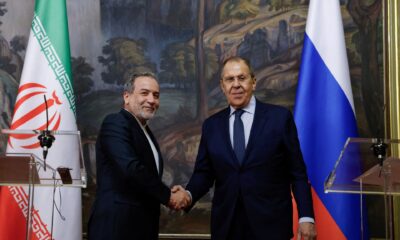
 Conflict Zones2 days ago
Conflict Zones2 days agoIran has ‘doubts’ about US intentions ahead of nuclear talks | Politics News
-
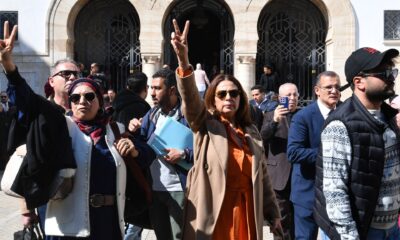
 Middle East1 day ago
Middle East1 day agoTunisian court hands opposition figures lengthy jail terms | Human Rights News
-
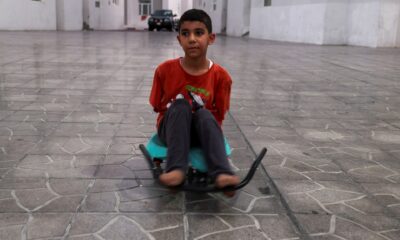
 Conflict Zones2 days ago
Conflict Zones2 days ago‘How do I live like this?’ asks Gaza boy who lost arms in Israeli attack | Gaza News
-

 Conflict Zones2 days ago
Conflict Zones2 days agoTrump says US may ‘pass’ on helping end war if Russia, Ukraine resist deal | Russia-Ukraine war News
-

 Europe1 day ago
Europe1 day agoVance, Vatican officials engage in ‘exchange of opinions’ over migrants




